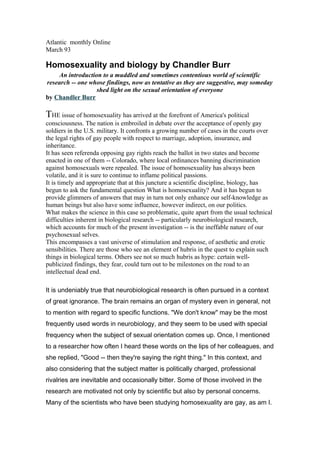Homosexuality and bio
- 1. Atlantic monthly Online March 93 Homosexuality and biology by Chandler Burr An introduction to a muddled and sometimes contentious world of scientific research -- one whose findings, now as tentative as they are suggestive, may someday shed light on the sexual orientation of everyone by Chandler Burr THE issue of homosexuality has arrived at the forefront of America's political consciousness. The nation is embroiled in debate over the acceptance of openly gay soldiers in the U.S. military. It confronts a growing number of cases in the courts over the legal rights of gay people with respect to marriage, adoption, insurance, and inheritance. It has seen referenda opposing gay rights reach the ballot in two states and become enacted in one of them -- Colorado, where local ordinances banning discrimination against homosexuals were repealed. The issue of homosexuality has always been volatile, and it is sure to continue to inflame political passions. It is timely and appropriate that at this juncture a scientific discipline, biology, has begun to ask the fundamental question What is homosexuality? And it has begun to provide glimmers of answers that may in turn not only enhance our self-knowledge as human beings but also have some influence, however indirect, on our politics. What makes the science in this case so problematic, quite apart from the usual technical difficulties inherent in biological research -- particularly neurobiological research, which accounts for much of the present investigation -- is the ineffable nature of our psychosexual selves. This encompasses a vast universe of stimulation and response, of aesthetic and erotic sensibilities. There are those who see an element of hubris in the quest to explain such things in biological terms. Others see not so much hubris as hype: certain well- publicized findings, they fear, could turn out to be milestones on the road to an intellectual dead end. It is undeniably true that neurobiological research is often pursued in a context of great ignorance. The brain remains an organ of mystery even in general, not to mention with regard to specific functions. "We don't know" may be the most frequently used words in neurobiology, and they seem to be used with special frequency when the subject of sexual orientation comes up. Once, I mentioned to a researcher how often I heard these words on the lips of her colleagues, and she replied, "Good -- then they're saying the right thing." In this context, and also considering that the subject matter is politically charged, professional rivalries are inevitable and occasionally bitter. Some of those involved in the research are motivated not only by scientific but also by personal concerns. Many of the scientists who have been studying homosexuality are gay, as am I.

